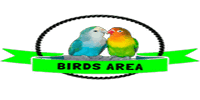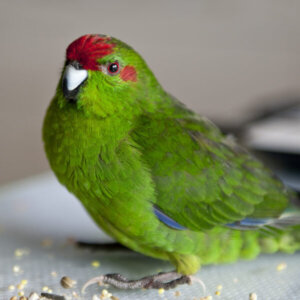Can Kakarikis Eat Mealworms? Discover the Surprising Truth
Yes, Kakarikis can eat mealworms. Mealworms are a protein-rich treat for these parrots.
But, it is crucial to feed them in moderation. Kakarikis are lively, colorful birds native to New Zealand. They have a varied diet that includes seeds, fruits, vegetables, and insects. Mealworms can be a beneficial addition to their diet, providing essential nutrients.
But, overfeeding mealworms can lead to health issues. It’s important to balance their diet with other foods to ensure they stay healthy. Mealworms should be a treat, not a staple. In this blog post, we will explore the benefits and potential risks of feeding mealworms to Kakarikis. We will also give you tips on how to incorporate them into your bird’s diet safely. Stay tuned to learn more about keeping your Kakariki healthy and happy!

Credit: en.wikipedia.org
Introduction To Kakarikis
Kakarikis are vibrant and charming birds. They originate from New Zealand. Their energetic nature and quirky personality make them popular pets. Understanding their dietary needs is important. This ensures a healthy and happy life for these delightful creatures.
About Kakarikis
Kakarikis, also known as New Zealand parakeets, are small and lively birds. Their feathers are bright green, often with red markings on the head. They are known for their playful and curious nature. These birds are very active and need space to move and explore. They are social and often bond well with their owners.
Dietary Needs
Kakarikis have diverse dietary needs. A balanced diet is key to their health. Their diet should include:
- Seeds: These are a staple but should be given in moderation.
- Fruits and Vegetables: Fresh produce is essential. Think apples, carrots, and leafy greens.
- Protein: Sources like boiled eggs and mealworms can be included. Mealworms are high in protein. They can be a good treat for your Kakariki.
Offering a variety of foods ensures they get all necessary nutrients. Fresh water should always be available.
What Are Mealworms?
Mealworms are the larvae of darkling beetles, often used as food for pets. Kakarikis can eat mealworms, providing them with protein.
Mealworms are the larvae of the darkling beetle. They are rich in nutrients and commonly used as food for various pets. These small, segmented worms are a favorite snack for many birds, reptiles, and even some small mammals.Nutritional Profile
Mealworms boast a remarkable nutritional profile. They are rich in protein, which is essential for muscle growth and repair. They also contain fats that provide a good source of energy.| Nutrient | Amount |
|---|---|
| Protein | 20% |
| Fat | 13% |
| Fiber | 2% |
Common Uses
Pet owners use mealworms in various ways. They serve as a primary food source for birds, especially during breeding seasons. Birds like Kakarikis benefit from the high protein content.- Bird Feed
- Reptile Food
- Fishing Bait
Are Mealworms Safe For Kakarikis?
Mealworms can be a nutritious treat for Kakarikis when given in moderation. Ensure they are sourced from a reputable supplier. This helps prevent any potential health risks.
Feeding Kakarikis a balanced diet is crucial for their health. Many bird owners wonder if mealworms are safe for these vibrant parrots. Let’s delve into the potential benefits and possible risks of feeding mealworms to Kakarikis.Potential Benefits
Mealworms can be a nutritious treat for Kakarikis. They are rich in protein, which helps in muscle development and overall growth. Here are some benefits:- High Protein Content: Supports muscle development and energy.
- Essential Fats: Contributes to healthy skin and feathers.
- Vitamins and Minerals: Provides essential nutrients for overall health.
Possible Risks
While mealworms offer benefits, there are risks to consider. Overfeeding can lead to health issues. Here are some possible risks:- Choking Hazard: Mealworms can pose a choking risk if not chewed properly.
- Allergic Reactions: Some birds may have allergies to mealworms.
- Unbalanced Diet: Relying too much on mealworms can lead to nutritional deficiencies.

Credit: en.wikipedia.org
Nutritional Benefits For Kakarikis
Kakarikis are lively birds that need a balanced diet. Mealworms can be a great addition to their diet. They offer essential nutrients that keep these birds healthy and active.
Protein Content
Mealworms are high in protein. This is crucial for Kakarikis. Protein helps in muscle development and repair. It also supports overall growth. For active birds, protein is vital.
| Nutrient | Amount per 100g |
|---|---|
| Protein | 20 grams |
Including mealworms in their diet ensures they get enough protein. This keeps them strong and energetic.
Vitamin And Mineral Contribution
Mealworms are rich in vitamins and minerals. These nutrients are important for Kakarikis. They support various bodily functions.
- Vitamin B12: Helps with energy production.
- Iron: Supports healthy blood cells.
- Calcium: Strengthens bones and beaks.
These nutrients contribute to a Kakariki’s overall health. They ensure the bird remains vibrant and lively.
Let’s look at some key vitamins and minerals in mealworms:
- Vitamin B12
- Iron
- Calcium
Adding mealworms to their diet is beneficial. It ensures they receive a range of nutrients. This keeps them healthy and happy.
Risks Of Feeding Mealworms
Feeding mealworms to your Kakarikis can pose several risks. Understanding these risks helps ensure your bird’s safety and health. Below are some specific concerns to keep in mind.
Choking Hazards
One of the primary risks is choking hazards. Mealworms are small, but their hard exoskeleton can make them difficult to swallow. This could cause your bird to choke. Ensure you always monitor your bird while it eats mealworms.
To minimize this risk, consider cutting the mealworms into smaller pieces. This makes them easier for your Kakariki to swallow. Alternatively, you can use dried mealworms, which are softer and less likely to cause choking.
Allergic Reactions
Another potential risk is allergic reactions. Some birds may be allergic to mealworms. Symptoms of an allergy include difficulty breathing, swelling, and itching. If you notice these signs, stop feeding mealworms immediately and consult a vet.
Before introducing mealworms to your bird’s diet, feed a small amount first. Watch for any allergic reactions. If your Kakariki shows no adverse effects, you can gradually increase the amount.
| Risk | Description | Prevention |
|---|---|---|
| Choking Hazards | Hard exoskeleton makes swallowing difficult | Cut into smaller pieces or use dried mealworms |
| Allergic Reactions | Signs include swelling and itching | Introduce in small amounts and monitor closely |
By understanding these risks, you can make informed decisions. This ensures your Kakariki stays healthy and happy.

Credit: animalia.bio
How To Introduce Mealworms
Introducing mealworms to your Kakarikis can be an exciting and nutritious addition to their diet. Mealworms are rich in protein and can provide essential nutrients for your bird. Below, we guide you on how to introduce mealworms to your Kakarikis and ensure their well-being.
Feeding Guidelines
Start by offering a small number of mealworms. This helps your Kakarikis get used to the new food.
- Quantity: Begin with 2-3 mealworms per feeding session.
- Frequency: Offer mealworms 2-3 times a week.
- Preparation: Ensure mealworms are fresh and clean. Rinse them with water before feeding.
Gradually increase the number of mealworms as your Kakarikis become more accustomed to them. Always observe your bird’s reaction to the new food.
Monitoring Your Bird
Keep a close eye on your Kakarikis after introducing mealworms. This will help you identify any changes in behavior or health.
- Check for Allergies: Look for signs of allergies, such as itching or swelling.
- Monitor Droppings: Watch for any changes in the color or consistency of droppings.
- Observe Energy Levels: Ensure your bird remains active and playful.
If you notice any unusual symptoms, consult a vet immediately. It’s crucial to ensure that mealworms are a beneficial addition to your Kakarikis’ diet.
| Signs to Monitor | Possible Issues |
|---|---|
| Excessive Scratching | Allergic Reaction |
| Changes in Droppings | Digestive Problems |
| Lethargy | Nutritional Imbalance |
Introducing mealworms should be a positive experience for your Kakarikis. Follow these steps to ensure their health and happiness.
Alternative Protein Sources
Kakarikis are curious and active birds. They need a balanced diet to stay healthy. While mealworms are a popular protein source, there are other options too. Exploring alternative protein sources can keep your Kakariki’s diet varied and nutritious.
Other Insects
Crickets are a great choice for Kakarikis. They provide high protein and are easy to find. Ensure they are gut-loaded before feeding. This means feeding the crickets nutritious food before giving them to your bird.
Grasshoppers are another option. They are rich in protein and safe for Kakarikis. Always ensure they are pesticide-free. You can buy them from pet stores or online.
Waxworms are also suitable. They are high in fat, so feed them sparingly. They can be a treat for your Kakariki. Remember, moderation is key.
Plant-based Options
Beans are a good plant-based protein source. Cook them well before feeding. Avoid using salt or spices. Lentils and chickpeas are nutritious choices.
Quinoa is another excellent option. It is high in protein and easy to prepare. Cook it thoroughly and let it cool before serving. Mix it with vegetables for added nutrients.
Tofu can also be included. It provides protein and is easy to digest. Offer small, plain pieces to your Kakariki. Avoid flavored or spiced tofu.
Frequently Asked Questions
Can Kakarikis Safely Eat Mealworms?
Yes, Kakarikis can safely eat mealworms. Mealworms provide protein and essential nutrients. However, they should be given in moderation.
How Often Should Kakarikis Eat Mealworms?
Kakarikis should eat mealworms once or twice a week. Overfeeding mealworms can lead to obesity and health issues.
Are Live Mealworms Better For Kakarikis?
Live mealworms are more nutritious and stimulating for Kakarikis. However, dried mealworms are a convenient alternative.
Do Mealworms Provide Nutritional Benefits For Kakarikis?
Yes, mealworms are high in protein and essential nutrients. They support Kakarikis’ overall health and vitality.
Conclusion
Mealworms can be a nutritious treat for Kakarikis. They provide protein and variety to their diet. Always feed them in moderation. Too many can cause health issues. Monitor your bird’s reaction closely. Every Kakariki is different. Offering a balanced diet ensures a happy, healthy pet.
Don’t forget to consult your vet for personalized advice. This way, your Kakariki enjoys a safe and satisfying diet.
Hello Dear, I'm Poli Kolymnia, owner of many birds (including budgies).
With a deep passion for these feathered companions, I'm here to share my expertise and extensive knowledge on birds care.
My articles cover essential topics like diet, housing, care, and health, providing practical tips to help you create a happy and thriving environment for your birds.




